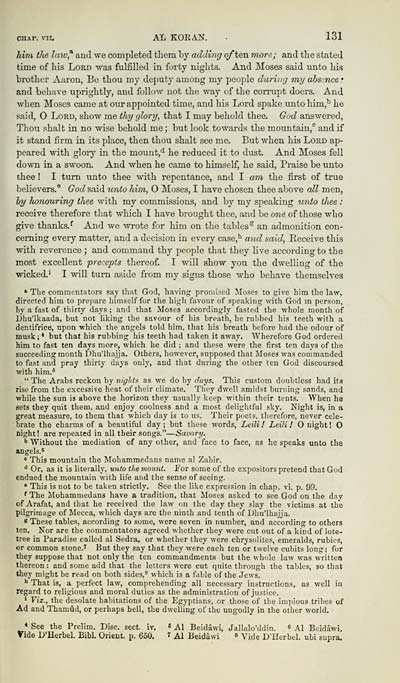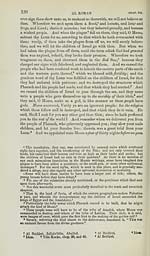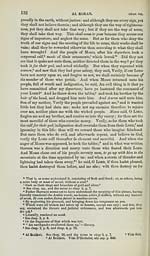Download files
Complete book:
Individual page:
Thumbnail gallery: Grid view | List view

cnAF. VII. AL KORAN. 131
him tlie laio^ and we completed them by adding of ten. more; and the stated
time of his Lord was fulfilled in foi-ty nights. And Moses said unto his
brother Aiiron, Be thou my deputy among my people daring my absence •
and behave uprightly, and follow not the way of the corrupt doers. And
when Moses came at our appointed time, and his Lord spake untohim,^ he
said, Lord, show me thj 'jlory, that I may behold thee. God answered,
Thou .'^halt in no wise behold me; but look towards the mountain,*^ and if
it stand firm in its place, then thou shalt see me. But when his Lord ap-
peared with glory in the mount,"^ he reduced it to dust. And Moses fell
down in a swoon. And when he came to himself, he said. Praise be unto
thee ! I turn unto thee with repentance, and I am the first of true
believers.® God said unto him, O Moses, I have chosen thee above all men,
by honouring thee with my commissions, and by my speaking unto thee :
receive therefore that which I have brought thee, and be one of those who
give thanks.'' And we wrote for him on the tables^ an admonition con-
cerning every matter, and a decision in every case,*^ and said, Receive this
with reverence ; and command thy people that they live according to the
most excellent precepts thereof. I will show you the dwelling of the
wicked.' I will tirm aside from my signs those who behave themselves
• The commentators say thnt God, having promised Moses to give him the law,
directed him to prepare himself for the high favour of speaking with God m person,
by a fast of thirty days ; and that Moses accordingly fasted the whole month of
lihu'lkaada, but not liking the savour of his breath, he rubbed his teeth with a
dentifrice, upon which the angels told him, that his breath before had the odour of
musk;* but that his rubbing his teeth had taken it away. Wherefore God ordered
him to fast ten days more, which he did ; and these were the first ten days of the
succeeding month Dhu'lhajja. Others, however, supposed that Closes was commanded
to fast and pray thirty days only, and that during the other ten God discoursed
with him.*
" The Arabs reckon by nigJits as we do by days. This custom doubtless had its
rise from the excessive heat of their climate. They dwell amidst burning sands, and
while the sun is above the horizon they usually keep within their tents. When he
sets they quit them, and enjoy coolness and a most delightful sky. Night is, in a
great measure, to them that which day is to us. Their poets, therefore, never cele-
brate the charms of a beautiful day; but these words, LeiliJ Leili ! night! O
night ! are repeated in all their songs." — Savary,
•> Without the mediation of any other, and face to face, as he speaks unto the
angels."
* This mountain the Mohammedans name al Zabir.
^ Or, as it is litei ally, unto the mount. For some of the expositors pretend that God
endued the mountain with life and the sense of seeing.
* This is not to be taken strictly. See the like expression in chap. vi. p. 99.
' The ilohammedans have a tradition, that Moses asked to see God on the day
of Arafat, and that he received the law (jn the day they slay the victims at the
pilgrimage of Mecca, which days are the ninth and tenth of Dhu'lhajja.
8 These tables, according to some, were seven in number, and according to others
ten. Nor are the commentators agreed whether they were cut out of a kind of lote-
tree in Paradise called al Sedra, or whether they were chrysolites, emeralds, rubies,
or common stone.^ But they say that they were each ten or twelve cubits long; for
they suppose that not only the ten commandments but the w hole law was written
thereon : and some add that the letters were cut quite through the tables, so that
they might be read on both sides,^ which is a fable of the Jews.
•" That is, a perfect law, comprehending all necessary instructions, as well in
regard to religious and moral duties as the administration of justice.
' Viz., the desolate habitations of the Egyptians, or those of the impious tribes of
Ad and Thamiid, or perhaps hell, the dwelling of the ungodly in the other world.
♦ See the Prelim. Disc. sect. iv. * Al Beidawi, Jallalo'ddin. « Al Bcidawi.
Vide D'Herbel. BibL Orient, p. 650. ' Al Beidawi 8 Vide DHerbel. ubi supra.
him tlie laio^ and we completed them by adding of ten. more; and the stated
time of his Lord was fulfilled in foi-ty nights. And Moses said unto his
brother Aiiron, Be thou my deputy among my people daring my absence •
and behave uprightly, and follow not the way of the corrupt doers. And
when Moses came at our appointed time, and his Lord spake untohim,^ he
said, Lord, show me thj 'jlory, that I may behold thee. God answered,
Thou .'^halt in no wise behold me; but look towards the mountain,*^ and if
it stand firm in its place, then thou shalt see me. But when his Lord ap-
peared with glory in the mount,"^ he reduced it to dust. And Moses fell
down in a swoon. And when he came to himself, he said. Praise be unto
thee ! I turn unto thee with repentance, and I am the first of true
believers.® God said unto him, O Moses, I have chosen thee above all men,
by honouring thee with my commissions, and by my speaking unto thee :
receive therefore that which I have brought thee, and be one of those who
give thanks.'' And we wrote for him on the tables^ an admonition con-
cerning every matter, and a decision in every case,*^ and said, Receive this
with reverence ; and command thy people that they live according to the
most excellent precepts thereof. I will show you the dwelling of the
wicked.' I will tirm aside from my signs those who behave themselves
• The commentators say thnt God, having promised Moses to give him the law,
directed him to prepare himself for the high favour of speaking with God m person,
by a fast of thirty days ; and that Moses accordingly fasted the whole month of
lihu'lkaada, but not liking the savour of his breath, he rubbed his teeth with a
dentifrice, upon which the angels told him, that his breath before had the odour of
musk;* but that his rubbing his teeth had taken it away. Wherefore God ordered
him to fast ten days more, which he did ; and these were the first ten days of the
succeeding month Dhu'lhajja. Others, however, supposed that Closes was commanded
to fast and pray thirty days only, and that during the other ten God discoursed
with him.*
" The Arabs reckon by nigJits as we do by days. This custom doubtless had its
rise from the excessive heat of their climate. They dwell amidst burning sands, and
while the sun is above the horizon they usually keep within their tents. When he
sets they quit them, and enjoy coolness and a most delightful sky. Night is, in a
great measure, to them that which day is to us. Their poets, therefore, never cele-
brate the charms of a beautiful day; but these words, LeiliJ Leili ! night! O
night ! are repeated in all their songs." — Savary,
•> Without the mediation of any other, and face to face, as he speaks unto the
angels."
* This mountain the Mohammedans name al Zabir.
^ Or, as it is litei ally, unto the mount. For some of the expositors pretend that God
endued the mountain with life and the sense of seeing.
* This is not to be taken strictly. See the like expression in chap. vi. p. 99.
' The ilohammedans have a tradition, that Moses asked to see God on the day
of Arafat, and that he received the law (jn the day they slay the victims at the
pilgrimage of Mecca, which days are the ninth and tenth of Dhu'lhajja.
8 These tables, according to some, were seven in number, and according to others
ten. Nor are the commentators agreed whether they were cut out of a kind of lote-
tree in Paradise called al Sedra, or whether they were chrysolites, emeralds, rubies,
or common stone.^ But they say that they were each ten or twelve cubits long; for
they suppose that not only the ten commandments but the w hole law was written
thereon : and some add that the letters were cut quite through the tables, so that
they might be read on both sides,^ which is a fable of the Jews.
•" That is, a perfect law, comprehending all necessary instructions, as well in
regard to religious and moral duties as the administration of justice.
' Viz., the desolate habitations of the Egyptians, or those of the impious tribes of
Ad and Thamiid, or perhaps hell, the dwelling of the ungodly in the other world.
♦ See the Prelim. Disc. sect. iv. * Al Beidawi, Jallalo'ddin. « Al Bcidawi.
Vide D'Herbel. BibL Orient, p. 650. ' Al Beidawi 8 Vide DHerbel. ubi supra.
Set display mode to: Large image | Transcription
Images and transcriptions on this page, including medium image downloads, may be used under the Creative Commons Attribution 4.0 International Licence unless otherwise stated. ![]()
| Early Gaelic Book Collections > J. F. Campbell Collection > Koran: or, Alcoran of Mohammed > (285) |
|---|
| Permanent URL | https://digital.nls.uk/77137230 |
|---|
| Description | Volumes from a collection of 610 books rich in Highland folklore, Ossianic literature and other Celtic subjects. Many of the books annotated by John Francis Campbell of Islay, who assembled the collection. |
|---|
| Description | Selected items from five 'Special and Named Printed Collections'. Includes books in Gaelic and other Celtic languages, works about the Gaels, their languages, literature, culture and history. |
|---|

